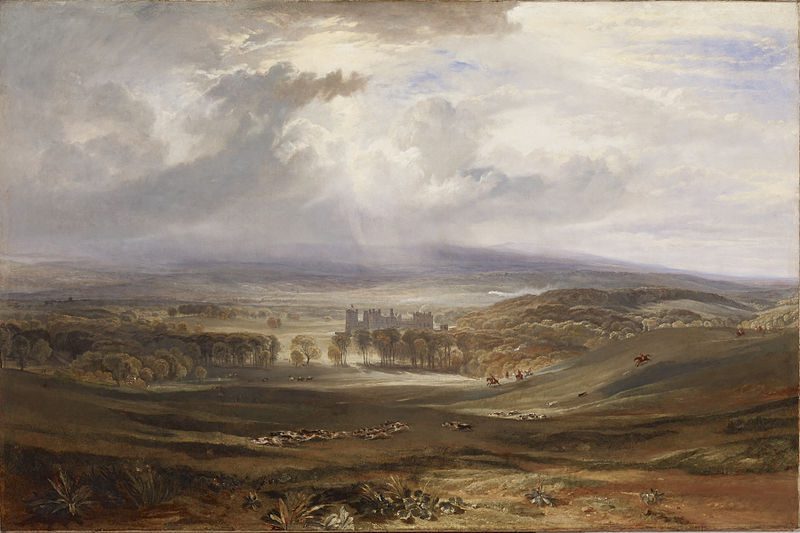Logotherapy & Stoicism in Viktor E. Frankl’s Man’s Search For Meaning
 |
|
Raby Castle, the Seat of the Earl of Darlington (1817) – J.M.W. Turner
Image from Wikipedia
|
I first read Man’s Search For Meaning a few months ago, but I’ve only just felt ready to write about it. It’s such an immensely provoking piece to read, and as a reader you feel quite unsettled after reading some sections. However, it is powerfully moral and philosophical, to say the least, and it must be one of the most obviously bibliotherapeutic (I’ll declare that a word) books I can think of.
Goodreads provides the following summary:
Psychiatrist Viktor Frankl’s memoir has riveted generations of readers with its descriptions of life in Nazi death camps and its lessons for spiritual survival. Between 1942 and 1945 Frankl labored in four different camps, including Auschwitz, while his parents, brother, and pregnant wife perished. Based on his own experience and the experiences of others he treated later in his practice, Frankl argues that we cannot avoid suffering but we can choose how to cope with it, find meaning in it, and move forward with renewed purpose. Frankl’s theory – known as logotherapy, from the Greek word logos (“meaning”) – holds that our primary drive in life is not pleasure, as Freud maintained, but the discovery and pursuit of what we personally find meaningful.
Logotherapy is something that I can deeply relate to, yet also something that I’ve done most of my life without ever giving it a name (rather like bibliotherapy). When I surround myself with meaningful relationships, experiences and activities, my mental health is considerably better than if not. I’m sure that a lot of you will have similar attitudes. Art is so important to me – particularly literature, as you may expect from my blog, but also the visual arts and music – and I couldn’t imagine a life devoid of it. A few years after my parents’ divorce I’d listen to music that both helped and hindered my state of mind: some songs allowed me to re-live negative memories, whilst others gave me the willpower required to distance myself from the event. More recently I’ve become able to realise this distinction, and therefore favour the latter trait in music and literature. But primarily, I’ve intentionally made an effort to pursue meaning and beauty. Doing this can aid almost any type of suffering, as Frankl demonstrates in this quote:
As the inner life of the prisoner tended to become more intense, he also experienced the beauty of art and nature as never before. Under their influence he sometimes even forgot his own frightful circumstances. If someone had seen our faces on the journey from Auschwitz to a Bavarian camp as we beheld the mountains of Salzburg with their summits glowing in the sunset, through the little barred windows of the prison carriage, he would never have believed that those were the faces of men who had given up all hope of life and liberty. Despite that factor–or maybe because of it–we were carried away by nature’s beauty, which we had missed for so long.
When writing about surviving life in a concentration camp, echoes of stoicism seems inevitable. Frankl quotes Dostoevsky’s declaration that man is a being who can get used to everything, and later states the following:
In spite of all the enforced physical and mental primitiveness of the life in a concentration camp, it was possible for spiritual life to deepen. Sensitive people who were used to a rich intellectual life may have suffered much pain (they were often of a delicate constitution), but the damage to their inner selves was less. They were able to retreat from their terrible surroundings to a life of inner riches and spiritual freedom. Only in this way can one explain the apparent paradox that some prisoners of a less hardy makeup often seemed to survive camp life better than did those of a robust nature.
Retreating into a “life of inner riches and spiritual freedom” greatly resounds with Marcus Aurelius’s teachings, a philosopher whom I seem to perpetually discuss on my blog. The extent of the trauma described in Frankl’s text is unimaginable to most of us, as is his survival of the experience and his ability to write about it. Nonetheless, this “inner retreat” can be utilised in so many situations in order to ease anxiety, low mood and the experience of difficult situations. We can pay attention to nature around us, recall pleasant memories, or create imagined places and experiences. To remind me to do this, I particularly like the following quote:
“Everything can be taken from a man but one thing: the last of the human freedoms—to choose one’s attitude in any given set of circumstances, to choose one’s own way.”
Although Man’s Search For Meaning is full of philosophical guidance, here are the three concepts that I’ve primarily dealt with in this blog post.
- Life needs meaning – whether love, art, nature, or something else profound – for survival and mental health.
- Regardless of the situation, your emotions cannot be removed from your control.
- Similarly, you can retreat into a “life of inner riches and spiritual freedom” at any time.
Enjoy more from me
- Retreat into my new book, Your Life in Bloom: Finding Your Path and Your Courage, Grounded in the Wisdom of Nature.
- I'm also the author of Mountain Song: A Journey to Finding Quiet in the Swiss Alps, a book about my time living alone by the mountains.
- If you love books, are feeling a little lost right now, and would love some gentle comfort and guidance, join The Sanctuary, my seven-day course to rebalance your life.
